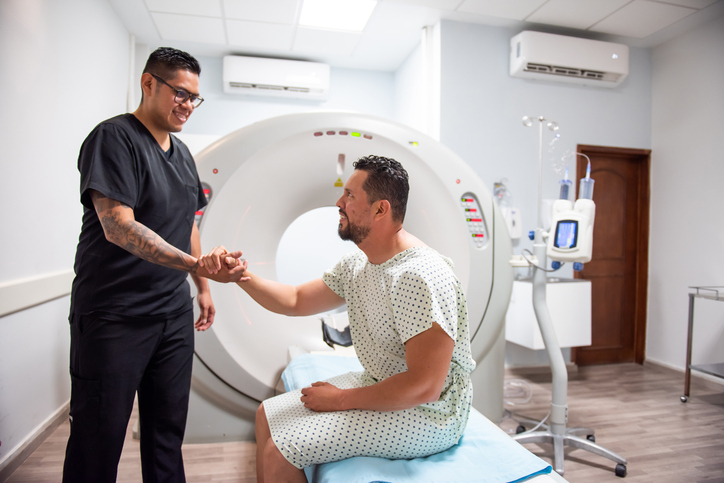What Happens If a Benign Tumor Is Left Untreated?

If you’ve been diagnosed with a benign tumor, you may feel a sense of relief knowing it’s not cancerous. However, it’s natural to wonder what happens if the tumor is left untreated. While benign tumors are generally not life-threatening, they still deserve careful monitoring and management to avoid potential complications.
Understanding Benign Tumors
A benign tumor is a mass of cells that grows but doesn’t spread to other parts of the body like malignant tumors do. They can occur in various areas of the body, including the brain, where their location and size can sometimes interfere with essential functions. Despite being non-cancerous, benign tumors can still cause symptoms if they press against surrounding tissues or nerves.
At The Preston Robert Tisch Brain Tumor Center, we understand that even the word “tumor” can be unsettling. Our mission is to empower patients like you by providing the information and support you need to make informed decisions about your care.
Can You Leave a Benign Tumor Untreated?

In many cases, benign tumors can be left untreated, especially if they’re small, not causing symptoms, and unlikely to interfere with normal body functions. This approach, often called “watchful waiting,” involves regular check-ups and imaging tests to monitor the tumor over time. However, this doesn’t mean ignoring the tumor altogether. Regular monitoring ensures that any changes in size or behavior are caught early.
If a benign tumor remains stable and symptom-free, there’s usually no need for immediate intervention. However, it’s crucial to keep an eye on it, as some tumors may grow or start to cause symptoms over time.
What Happens if a Benign Tumor Grows?
If a benign tumor begins to grow, the impact largely depends on its location. For example, a benign brain tumor could press on surrounding tissue, causing symptoms like headaches, dizziness, or changes in cognitive function. The most common concerns with growing benign tumors include:
- Increased pressure on nearby structures: In the brain, this can lead to neurological issues like vision problems, memory loss, or difficulty with motor skills.
- Pain and discomfort: As the tumor expands, it may compress nerves or tissues, causing pain or discomfort.
- Impaired function: Tumors in critical areas like the brain or spinal cord can interfere with essential functions such as movement or speech.
If growth is detected, your medical team will discuss possible treatments to prevent complications. The decision to intervene often depends on how much the tumor affects your daily life.
Can Benign Tumors Become Cancerous?
It’s rare, but some benign tumors have the potential to become malignant over time. This process, called malignant transformation, is uncommon, especially in tumors that have been stable for long periods. However, this is one reason why regular monitoring is essential. Catching changes early allows for timely intervention if the tumor starts to behave differently.
The Preston Robert Tisch Brain Tumor Center is at the forefront of research and treatment for brain tumors, both benign and malignant. Our team of over 250 experts is dedicated to offering cutting-edge care and personalized treatment plans to every patient, ensuring that your health is always our top priority.
Can a Benign Tumor Go Away on Its Own?
It’s rare for benign tumors to disappear without treatment. Most remain stable or grow slowly over time. In very few cases, hormonal changes or immune responses might cause a benign tumor to shrink, but this is not something that can be expected.
Instead, the focus is on monitoring the tumor to ensure it doesn’t grow or start to cause problems.
There’s no guaranteed way to prevent a benign tumor from growing, but regular monitoring through imaging tests can help track any changes in size. In some cases, if the tumor begins to grow or cause symptoms, treatments like surgery or radiation therapy may be recommended to stop its progression.
At The Preston Robert Tisch Brain Tumor Center, we offer comprehensive care plans that prioritize both treatment and quality of life, ensuring that you feel supported at every step of your journey.
Living with a Benign Tumor
Many people live with benign tumors for years without needing treatment. If your tumor isn’t causing symptoms or interfering with daily activities, your doctor may recommend regular check-ups to monitor its growth. This approach helps avoid unnecessary interventions while still keeping your health under close watch.
It’s important to communicate with your care team about any new symptoms or concerns you may have. Even if your tumor is stable, staying informed and engaged in your care is key to maintaining a good quality of life.
Get Expert Care at a Leading Brain Tumor Center
The Preston Robert Tisch Brain Tumor Center at Duke stands as a global leader in brain tumor research and treatment. With access to groundbreaking therapies, advanced clinical trials, and a team of experts, the center provides hope and personalized care to patients from around the world. Our mission is not only to treat but also to improve the quality of life for those affected by brain tumors.
Ready to learn more about your treatment options? Schedule an appointment with our team today to discuss your tumor diagnosis and treatment options.
We understand that each patient is unique. Our team of doctors offers treatment plans tailored to your or your child’s circumstances and goals. We also offer access to cutting-edge clinical trials to stay at the forefront of brain tumor treatment.
Want to learn more about brain tumor care? Explore related articles on our blog:
- Do Brain Tumors Show Up In Blood Work?
- Can an MRI Tell If a Tumor Is Benign?
- How Long Does It Take the Brain to Heal After Tumor Removal?
FAQs: When a Benign Tumor Is Left Untreated
Can you live with a benign tumor?
Yes, many people live with benign tumors without needing treatment. The key is regular check-ups to monitor any changes and ensure that the tumor doesn’t interfere with your health or well-being.
Can a benign tumor go away on its own?
This is rare. Most benign tumors will remain stable or grow slowly over time. It’s uncommon for a benign tumor to shrink or disappear without treatment.
How long does it take for a benign tumor to become malignant?
While it’s uncommon, some benign tumors can become malignant over several years. Regular monitoring helps detect any early signs of this transformation.
What happens if a benign tumor grows?
If a benign tumor grows, it can cause symptoms like pain, pressure, or impaired function, depending on its location. At this point, treatment options such as surgery may be considered to prevent complications.
When should I be concerned about a benign tumor?
You should contact your doctor if you notice rapid tumor growth, new or worsening symptoms, or if the tumor starts to interfere with your daily life. Early intervention can help prevent further complications.
Does having a benign tumor make you tired?
In some cases, benign tumors can cause fatigue, especially if they affect areas of the brain that control sleep, hormone levels, or energy regulation.